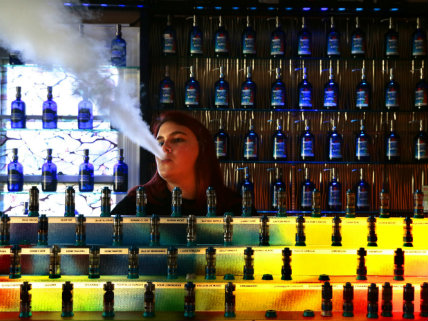Trump Could, And Should, Save Vaping Industry From FDA's Costly Regulations
New report calls for Trump administration to make it easier for Americans to switch from smoking to vaping.

If President Donald Trump is looking for an easy way to bring American jobs back—without imposing tariffs, building walls, or imposing other big government policies that will cost American consumers more in the long run—and ease regulations on American businesses, he could start by repealing new regulations for electronic cigarettes approved in August by the Food and Drug Administration.
Those regulations for electronic cigarettes adopted by the FDA during the final year of the Obama administration could, if left on the books, effectively wipe out large swaths of the vaping industry. The Smoke-Free Alternatives Trade Association, an e-cigarette industry group, believes as much as 99 percent of all vaping products could be affected.
That costs jobs, of course, but it also curtails the potential health benefits from getting Americans to switch from smoking to vaping.
A new report released this week by the R Street Institute, a Washington, D.C.-based free market think tank, argues that the Trump administration should take immediate steps to overturn the FDA deeming rule and other federal impediments to the growth of vaping.
"Perverse tobacco policy is failing the American public and will soon destroy thousands of small and medium-sized businesses that are part of the solution, not part of the problem," write Clive Bates, former director of the United Kingdom's Action on Smoking and Health; Eli Lehrer, president of the R Street Institute; and David Sweanor, a professor at the University of Ottawa's Center for Health Law, the three authors of the R Street report.
Among the eight recommendations in the report, the most important is probably wiping away the 2016 reinterpretation of a 2009 law giving the FDA authority to regulate electronic cigarettes and e-liquid by the same standards as tobacco products like cigarettes—yes, even though there is no tobacco in e-cigarettes.
As Reason's Jacob Sullum has written, this is essentially a slow-motion ban on many vaping products. The FDA's application process will cost as much as $1 million and a separate application will be required for each and every product. Smaller manufacturers unable to afford the costly application process will likely be driven out of the market, or will be bought up by larger businesses. Any product that has been introduced since 2009 is subject to the new rules and manufacturers have until later this year to either pull their products off shelves, or pay up and get approved.
So far, there have been no signals from the Trump administration on whether it will continue with Obama-era policies on e-cigarettes or move in a new direction. It's unlikely that there will be any major policy announcements until Trump chooses a new FDA commissioner—something that he's unlikely to do until after his pick to run the U.S. Department of Health and Human Services, Congressman Tom Price (R-Georgia) is confirmed by the Senate.
Jim O'Neill, a managing director at Mithril Capital, an investment firm co-launched by Peter Thiel, has been rumored to be on Trump's shortlist to run the FDA.
Vaping businesses are hoping to see quick action from the new administration.
"We believe something needs to be done to protect the thousands of businesses that are a crucial player in the global tobacco harm reduction strategy, and help those who are eager to quit smoking have easy access to vaping products," said Patricia Kovacevic, general counsel for Nicopure Labs, a Florida-based manufacturer of e-cigarette fluid that has launched a lawsuit challenging the FDA's deeming rule.
Another major change recommended in the R Street report is allowing vaping products to be advertised as what they are: healthier than traditional cigarettes.
The authors note that vaping isn't completely safe—few things are—but evidence shows that vaping is safer than combustion-based products like cigarettes and cigars.
Guy Bentley, a research associate for the Reason Foundation (which publishes this blog), writes at the Washington Examiner that more than 480,000 Americans died from smoking-related diseases in 2015. That's more than alcohol, car, illicit drug, HIV and gun deaths combined. The cause of these deaths is the deadly smoke inhaled into the lungs, not nicotine.
The growth of vaping as a substitute for traditional forms of smoking means "smokers can mimic the experience of smoking and get the nicotine they desire while significantly reducing their risk for deadly disease," Bentley writes.
The rationale for holding e-cigarettes to the same regulatory standard as traditional, tobacco-containing cigarettes is built on the questionable assumption that Americans who smoke e-cigarettes will end up smoking traditional cigarettes too.
While many e-cigarettes contain nicotine extracted from tobacco, but considering them the equivalent of cigarettes is an affront to common sense and medical science. There's no combustion, no smoke and no tar in e-cigarettes, along with fewer cancer-causing chemicals. One study from the United Kingdom found that e-cigarettes are 95 percent safer than their combustible cousins. Driving e-cigarettes out of the marketplace, as the FDA's new rules are almost certain to do, will make it harder for nicotine-addicted smokers to kick the habit by taking up a safer alternatives.
Despite all those arguments, perhaps the best example of the absurdity of the FDA's decision to classify e-cigarettes as tobacco products is the simple fact that vaping doesn't involve tobacco. In fact, some e-cigarette makers offer "tobacco free" nicotine that is synthesized in a lab or produced from other types of plants, like tomatoes and green peppers.
If the federal government continues taking a hard-line stance that prohibits vaping, or makes vaping products so expensive or difficult to obtain that they effectively are prohibited, it is only standing in the way of potential health benefits of Americans switching from smoking to vaping.


Show Comments (26)